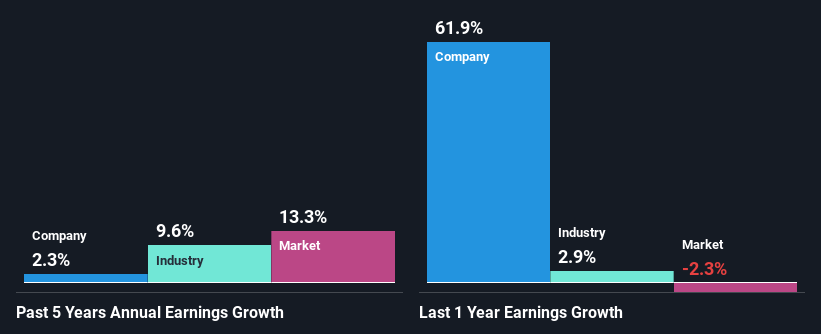VSE Corporation (NASDAQ:VSEC) Is Going Strong But Fundamentals Appear To Be Mixed : Is There A Clear Direction For The Stock?
VSE (NASDAQ:VSEC) has had a great run on the share market with its stock up by a significant 34% over the last three months. But the company's key financial indicators appear to be differing across the board and that makes us question whether or not the company's current share price momentum can be maintained. In this article, we decided to focus on VSE's ROE.
Return on equity or ROE is an important factor to be considered by a shareholder because it tells them how effectively their capital is being reinvested. In other words, it is a profitability ratio which measures the rate of return on the capital provided by the company's shareholders.
See our latest analysis for VSE
How To Calculate Return On Equity?
ROE can be calculated by using the formula:
Return on Equity = Net Profit (from continuing operations) ÷ Shareholders' Equity
So, based on the above formula, the ROE for VSE is:
7.0% = US$43m ÷ US$617m (Based on the trailing twelve months to December 2023).
The 'return' is the profit over the last twelve months. That means that for every $1 worth of shareholders' equity, the company generated $0.07 in profit.
Why Is ROE Important For Earnings Growth?
So far, we've learned that ROE is a measure of a company's profitability. Depending on how much of these profits the company reinvests or "retains", and how effectively it does so, we are then able to assess a company’s earnings growth potential. Assuming everything else remains unchanged, the higher the ROE and profit retention, the higher the growth rate of a company compared to companies that don't necessarily bear these characteristics.
A Side By Side comparison of VSE's Earnings Growth And 7.0% ROE
On the face of it, VSE's ROE is not much to talk about. A quick further study shows that the company's ROE doesn't compare favorably to the industry average of 9.2% either. Thus, the low net income growth of 2.3% seen by VSE over the past five years could probably be the result of the low ROE.
We then compared VSE's net income growth with the industry and found that the company's growth figure is lower than the average industry growth rate of 9.6% in the same 5-year period, which is a bit concerning.
Earnings growth is a huge factor in stock valuation. The investor should try to establish if the expected growth or decline in earnings, whichever the case may be, is priced in. Doing so will help them establish if the stock's future looks promising or ominous. Has the market priced in the future outlook for VSEC? You can find out in our latest intrinsic value infographic research report.
Is VSE Efficiently Re-investing Its Profits?
VSE's low three-year median payout ratio of 17% (or a retention ratio of 83%) should mean that the company is retaining most of its earnings to fuel its growth. This should be reflected in its earnings growth number, but that's not the case. Therefore, there might be some other reasons to explain the lack in that respect. For example, the business could be in decline.
Moreover, VSE has been paying dividends for at least ten years or more suggesting that management must have perceived that the shareholders prefer dividends over earnings growth. Existing analyst estimates suggest that the company's future payout ratio is expected to drop to 8.4% over the next three years.
Summary
Overall, we have mixed feelings about VSE. Even though it appears to be retaining most of its profits, given the low ROE, investors may not be benefitting from all that reinvestment after all. The low earnings growth suggests our theory correct. Having said that, looking at the current analyst estimates, we found that the company's earnings are expected to gain momentum. To know more about the company's future earnings growth forecasts take a look at this free report on analyst forecasts for the company to find out more.
Have feedback on this article? Concerned about the content? Get in touch with us directly. Alternatively, email editorial-team (at) simplywallst.com.
This article by Simply Wall St is general in nature. We provide commentary based on historical data and analyst forecasts only using an unbiased methodology and our articles are not intended to be financial advice. It does not constitute a recommendation to buy or sell any stock, and does not take account of your objectives, or your financial situation. We aim to bring you long-term focused analysis driven by fundamental data. Note that our analysis may not factor in the latest price-sensitive company announcements or qualitative material. Simply Wall St has no position in any stocks mentioned.

 Yahoo Finance
Yahoo Finance 
